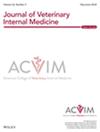Changes in Serum Proteomic Profiles at Different Stages of Pregnancy Toxemia in Goats
Abstract
Background
In human medicine, serum proteome profiles are used to differentiate metabolic diseases and evaluate their pathophysiology. Understanding the serum proteome profiles of goats with pregnancy toxemia might help identify the proteomes and pathways responsible for the development of this disease and improve diagnosis and treatment.
Hypothesis/Aim
Determine biomarkers that differentiate healthy goats from goats with subclinical pregnancy toxemia (SPT) and clinical pregnancy toxemia (CPT) using serum proteome analysis. In addition, serum protein differences were evaluated to distinguish between SPT and CPT.
Animals
Thirty-five hair goats were included, with 15 in the SPT group, 10 in the CPT group, and 10 in the control group.
Methods
The cross-sectional study was conducted with animals from goat farms in Bingol, Türkiye, between December 2023 and May 2024. Serum samples were investigated using mass spectrometry-based proteomic analysis.
Results
Proteomic profiles showed significant variation in relative protein abundance. Twenty-five proteins were significantly (p ≤ 0.01) differentially expressed between animals with pregnancy toxemia and those of the control group, with ≥ 2-fold changes in abundance. Proteins involved in cellular, biological, and molecular processes, including processes related to reactive oxygen species, cytokine activation, acute phase response signaling, lipid metabolism, and antimicrobial activity were altered in animals with pregnancy toxemia.
Conclusion and Clinical Importance
The proteomic candidates identified are biomarkers that may facilitate the diagnosis, treatment, and management of pregnancy toxemia in goats. Serum proteomic biomarkers could be used in rapid tests in the future and may improve the management of pregnancy toxemia on farms.

 求助内容:
求助内容: 应助结果提醒方式:
应助结果提醒方式:


